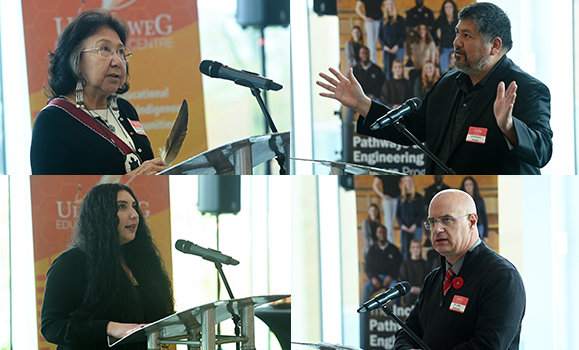The Indigenous Student Centre on Sexton (ISCoS) is quickly becoming the heart of Indigenous student life on ±«Óătv’s downtown campus.
The Faculty of Engineering officially opened the doors to the centre this week, marking a milestone in its efforts to create a more inclusive campus.ĚýStudents in the Faculty of Architecture and Planning, also located on Sexton Campus, are welcome in the centre as well.Ěý
 Ěý
Ěý
The centre — which features study and collaboration spaces, an in-house program coordinator, and a virbrant, colourful atmosphere — has been designed as a place where community and learning come together.
But Dr. John Newhook, dean of the Faculty, said the space represents far more than a spot for students to gather between classes.
“It’s a space designed for students to connect, engage, learn, share experiences, and celebrate their culture,” said Dr. Newhook at the centre’s opening this week.
Building pathwaysĚý
The centre builds on the success of the Inclusive Pathways to Engineering Careers Program, launched in 2023 with community leaders. The program removes barriers and increases access to engineering education for equity-deserving groups.

Speakers at the opening ceremony for the Indigenous Student Centre on Sexton (clockwise from top left): Elder Ann LaBillois (±«Óătv Elder in Residence); Christopher Googoo (Chief Operating Officer of Ulnooweg); John Newhook (Dean, Faculty of Engineering);ĚýIngrid Kassem (student).
The Faculty partnered with the Ulnooweg Education Centre to introduce the Indigenous stream of the Pathways Program to provide academic preparation, mentorship, cultural support, and career guidance to Indigenous students across the region. A second stream for African Nova Scotian and Black students launched last winter with community partners supporting Black excellence in education.
These programs speak volumes to the inclusive vision we are creating between students, faculty, and community
“These programs speak volumes to the inclusive vision we are creating between students, faculty, and community,” says Sherida Sherry Hassanali, assistant dean, EDIA in the Faculty of Engineering. “We are creating places and spaces for transformation, healing, and growth.”
She adds that the programs also serve as an invitation to communities that have been historically marginalized and reinforces Dal Engineering’s commitment to a warm and inclusive learning environment.
The Indigenous Pathways Program welcomed its first cohort in September 2024. Since then, the number of Indigenous students in engineering at Dal has grown. By 2029, the broader pathways program is expected to graduate at least forty additional Indigenous, African Nova Scotian, and Black students.
“When we launched the Indigenous Stream, one of our top priorities was ensuring students had not only the supports they needed to succeed, but also a space that truly felt like their own,” says Hassanali.
Celebrating culture
The new centre brings that vision to life, providing a bright, welcoming environment where students can build relationships, and access the resources they need.
Located on the fifth floor of Angus L. MacDonald Building, the space combines areas for focused work, collaboration, and relaxation. At its heart is a bold orange accent wall, chosen for healing, remembrance, and cultural significance. A local artist will soon add a blue “river” through the orange, symbolizing movement, connection, and life.
“Space and place are inherently connected to identity,” says Hassanali. “ISCoS is a place where students can bring their culture, their histories, their stories . . . it is a place where they can just be.”Ěý
This is a place where students can bring their culture, their histories, their stories . . . it is a place where they can just be.
Plans are underway to allow smudging in the centre, creating a dedicated space for important cultural practices. Students can also access support and guidance from the Faculty’s Indigenous Program Coordinator, whose office is now located within the space.
The welcoming atmosphere also includes artwork generously donated by Denise Pothier, a ±«Óătv Chemical Engineering alum and longtime diversity advocate. She is also an active member of the Indigenous Pathways Program Advisory Council, which includes investment and community partners, faculty, staff, Elders, knowledge keepers, and current and former students.Ěý
Community support
This spirit of collaboration extends far beyond individual contributions. From the very beginning, the pathways program has been built on strong partnerships with organizations, donors, and community members.Ěý
Ulnooweg Education Centre, CBCL Limited, EverWind Fuels, Pomerleau, ±«Óătv Engineering alumni Bernie and Anne MacIsaac, and the Johnson Scholarship Fund all played a vital role in helping turn the program’s vision to life.
“The pathways program is more than an educational initiative,” says Dr. Newhook. “It’s a program built on trust, relationships, and a shared commitment to supporting students from equity-deserving communities. None of this would have been possible without the support of our partners and friends.”Ěý

